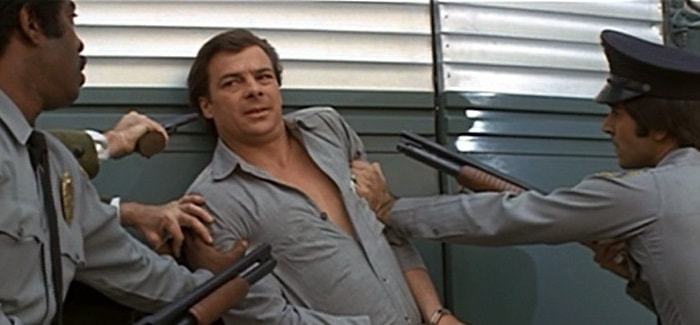|
John Carpenter's Assault on Precinct 13 is an archetypal cult film. All but shunned by US critics on its release in 1976, it won a rapturous reception at the London Film Festival a year later. It was remade in 2005, is now seen as one of the best action films of the '70s, and yet is still arguably underrated. Assault was shot in November 1975 on a budget of just $100,000. Carpenter could not afford to make a western, as planned: to cut costs, Carpenter refashioned the film as a contemporary thriller which transplanted the siege scenario of Rio Bravo (1959) to an isolated Los Angeles police station. A triumph of economical film-making, Assault is short on costly special effects but uses atmospheric music, a terse script, and confined sets to build tension. Also crucial to the film's success are a trio of brilliant performances by little-known actors: Austin Stoker as capable cop Ethan Bishop, Laurie Zimmer as tough secretary Leigh, and Darwin Joston as the mysterious, convicted felon Napoleon Wilson. Wilson may be one of the most intriguing characters in American action cinema. Imprisoned for the killing of several men, Wilson is brought to the police station just as the malevolent gang "Street Thunder" begin their attack. Lt. Bishop is forced to release Wilson and another prisoner, Wells (Tony Burton), to help defend the station when no official backup arrives. True to his notorious reputation, Wilson proves to be a formidable ally in the battle and develops a bond with Bishop. Wilson's character is fascinating because of the perfect fit between his mysterious persona and Joston's performance. From his first introduction, Wilson is beset by questions about the riddle of his background and his crimes. To hated cop Starker, he offers only a kind of fable which references Once Upon a Time in the West: "First time I ever saw a preacher, he said to me 'there's something strange about you. You got something to do with death.' Turns out he was right." While Wilson frustrates attempts by others to learn about him, he subtly obtains information about other people. His repeated question "got a smoke?" is not only one of Assault's numerous references to Howard Hawks' westerns, but also a kind of litmus test. Brutal cops and jailers respond rudely, while Bishop politely explains that he does not smoke and Leigh offers a cigarette. Wilson uses these subtle cues to judge the people he meets. Both Wilson and the film itself tease answers to his enigma that are never provided. His laconic promise to explain the origin of his first name "at the point of dying", is another reference to Leone's Once Upon a Time in the West. We know only that Wilson does not deny killing multiple men, and proves a proficient killer during the siege. His defiant and heroic actions over the course of the film invite us to see him as heroic, but his mysteries torment us with the possibility that he may be if not evil, then a very bad person indeed. Darwin Joston plays Wilson beautifully, alternating smoothly between quiet defiance and deadly ferocity. Joston was Carpenter's neighbour at the time, and mainly experienced in theatre. Although he had a small part in Carpenter's The Fog (1980), he found roles hard to come by during the 1980s. He worked in transportation for film productions and took small TV parts, and sadly died of leukaemia, aged 60, in 1998. Assault on Precinct 13 would prove to be the most accomplished and notable work by Joston, an actor who was under-utilised during his lifetime and is only now receiving the praise due to him. In the uniquely magnetic and mysterious character of Napoleon Wilson, he will likely remain a cult figure for years to come.
0 Comments
Your comment will be posted after it is approved.
Leave a Reply. |
About
Exploring classic science fiction, with a focus on the 1950s to the 1990s. Also contributing to Entertainium, where I regularly review new games. Categories
All
|

